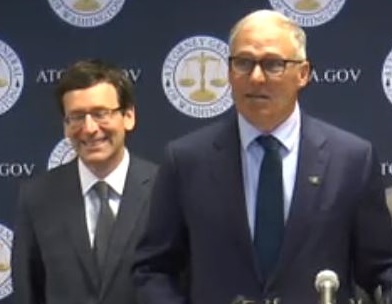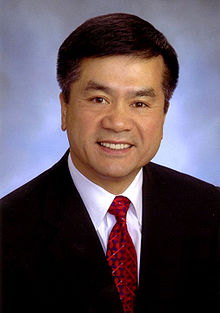$30 license tabs: Political leaders ignore public resentment, sabotage initiative, defy voters
As Republicans offer solutions, Dems put government ahead of people
 Gov. Jay Inslee, right, held up funding for road projects in areas that supported I-976 — even though they are funded by the gas tax, not car tabs. Attorney General Bob Ferguson sabotaged the initiative, refused to recuse his office from the case, and has mounted a shockingly weak defense.
Gov. Jay Inslee, right, held up funding for road projects in areas that supported I-976 — even though they are funded by the gas tax, not car tabs. Attorney General Bob Ferguson sabotaged the initiative, refused to recuse his office from the case, and has mounted a shockingly weak defense.
Initiative 976 is at the heart of the worst case of partisan misconduct of recent times. Democratic lawmakers ignored complaints about a misleading Sound Transit ballot measure that revived a much-hated car-tab tax. So last November Washington citizens took the matter to the ballot. They voted to eliminate car-tab taxes and set renewals at $30 – just as they did in 1999 and 2002. But Democratic leaders weren’t willing to accept the people’s rebuke, as they did 20 years ago (see below). Instead, they sabotaged the initiative, announced plans to punish regions that voted for it, set up a court challenge, and prevented an adequate legal defense from being mounted.
- Started with a deceptive political campaign. In 2016, voters in King, Pierce and Snohomish counties approved a $54 billion Sound Transit bond issue for light rail construction. They didn’t know it would bring back the notorious car-tab tax of the ‘90s, which overvalues vehicles for tax purposes. Legal language obscured key provisions, violating the state constitution. Then the campaign lied about the measure’s effect.
- Legislature does nothing. Complaints flooded the statehouse when people got their car-tab bills – often hundreds of dollars higher. Republicans offered proposals to cut taxes while allowing light rail construction to continue. But Democrats blocked every proposal for meaningful reform. An initiative was the only way out.
- Ferguson sabotages I-976. State law requires the attorney general to write ballot titles for initiatives. Bob Ferguson’s office made a factual error, giving opponents grounds for a post-election challenge. Then Democratic allies in Seattle and King County governments filed suit. Ferguson has refused to recuse his office from the case and has mounted a shockingly weak defense, preventing more competent representation. Ferguson has a clear conflict – in another case, he is prosecuting the initiative’s sponsor.
- Inslee punishes voters. Jay Inslee has ordered the Department of Transportation to postpone funding for road projects in areas of the state that voted for the initiative. Yet car tabs have nothing to do with those projects – they are funded by the gas tax.
- Republicans offer solutions. Ideas include using vehicle sales tax money to backstop key programs. Twenty years ago, the Legislature proved it could deal with this issue and treat voters with respect. When the people speak, the Legislature should listen.
$30 license tabs: What happened the first time
When voters slashed car tabs 20 years ago, Olympia accepted their verdict
 When courts threatened to overturn Initiative 695, Gov. Gary Locke said Olympia should listen to voters and enact the same tax cut on its own.[/caption]
When courts threatened to overturn Initiative 695, Gov. Gary Locke said Olympia should listen to voters and enact the same tax cut on its own.[/caption]
Washington voters repeated history when they approved Initiative 976 in 2019. The measure slashed car tabs to $30, just like another ballot measure exactly 20 years before. Both versions responded to public frustration with high car-tab taxes that exaggerate car values for tax purposes. There was no meaningful difference between them. Yet reaction from the Legislature was very different. In 2000, chastened lawmakers recognized they had gone too far, and they decided to make things right.
The people haven’t changed, but the attitudes of elected officials certainly have. Today Democratic leaders are standing in defiance of the voters, determined to maintain tax increases the people don’t want. What happened two decades ago offers a lesson for 2020.
-
-
- 1993-1999 – Public seethes about car tabs. For years Washington residents grumbled about the motor vehicle excise tax, the annual tax on cars and trucks that was paid when license tabs are renewed. Resentment grew when rates were raised in 1993. Six years later this frustration led voters to approve Initiative 695, 56-44 percent, repealing the car-tab tax and setting renewal fees at $30. This was the second successful tax revolt in Washington history, following I-601 in 1993.
- 2000 – Legislature passes the same measure. A King County transit union filed suit, and a Superior Court judge threw out the initiative on a technicality. As appeals progressed, nervous lawmakers, mindful of public resentment and the consequences of inaction, decided they needed to address the problem in some manner. Gov. Gary Locke said:
-
“Regardless of the court’s ruling today, $30 car tabs are here to stay. It is clear the voters disliked – hated – high car-tab taxes.”
At Locke’s urging, the Legislature voted $30 car tabs into law. That fall, the Supreme Court overturned I-695, but the reduction remained in force.
-
-
- 2002 – A second vote against high car tabs. Washington voters hated the car-tab tax so much, they killed it twice. In 2002 they voted for Initiative 776, a measure designed to survive legal challenges, by 51-49 percent. After years of court battles, the state Supreme Court allowed it to stand, but permitted Sound Transit to continue collecting taxes in King, Pierce and Snohomish counties, because bonds had already been issued.
-






